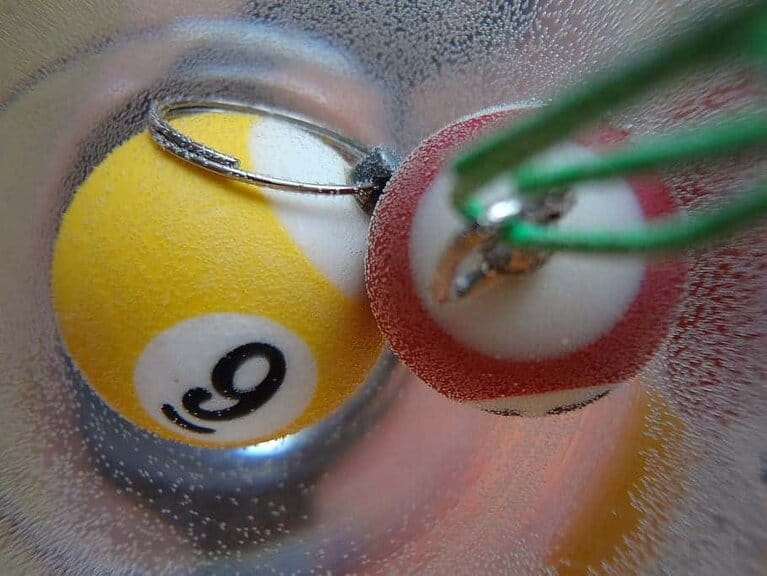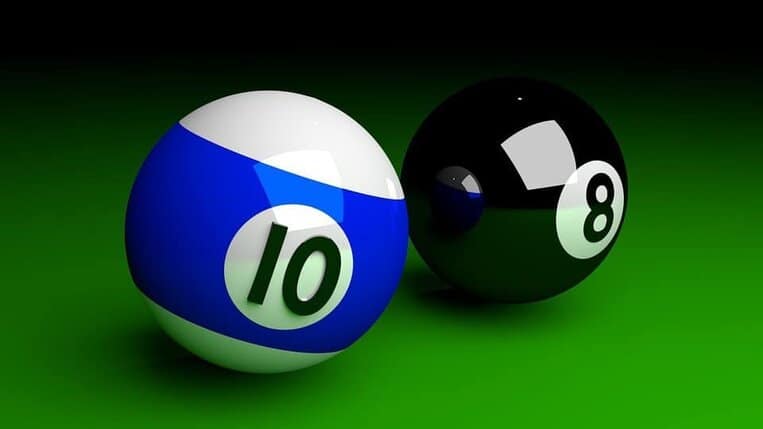Soak your pool balls in lukewarm water with a cleaning solution or mild soap for a few minutes. Then, scrub each pool ball with a microfiber towel or soft-bristled brush. Don’t forget to polish your pool balls whenever necessary.
Having a pool table at home and enjoying a game on the weekend with loved ones comes with a few responsibilities, like cleaning your table and pool balls.
Considering how the game is played, the pool balls could easily transfer girt, germs, and other contaminants from players’ hands to the pool balls to the table and you!
To stop this from happening, clean your pool balls and table frequently. Not only will you keep all of your equipment sanitary, but you will also extend the life of your pool balls.
How To Clean Pool Balls: Quick Guide
If you play billiards often, your pool balls will be covered in chalk. And if you don’t clean them regularly, all that chalk build-up can affect your game, so make sure to clean them today by following these steps.
Step 1: Soak Your Pool Balls In A Cleaning Solution

Mix some lukewarm water and the cleaner in a large bucket.
The water must be at the right temperature because hot water could damage your pool balls, especially if they’re polyester or acrylic-based, while cold water won’t clean them effectively.
As for the cleaner, there’s a wide range of options for the cleaner, including a mild detergent or soap such as Palmolive or Dawn or commercial pool ball cleaner.
Avoid common household cleaners because most have harsh chemicals that damage or bleach your pool balls.
When you make your pick, add a moderate amount or the ascribed amount of cleaner to your bucket of lukewarm water and let your pool balls soak for a few minutes.
Step 2: Get Cleaning!
Soaking your pool balls for some time will help loosen any dirt buildup on their surface, making the cleaning process much easier.
Then, you can easily scrub each pool ball with a microfiber towel or soft-bristled brush. Avoid hard-bristled brushes as they will probably scratch their surfaces.
Then, rinse each pool ball individually in warm water. Finally, dry each pool ball with a clean towel.
Don’t let your balls air dry, as this will leave marks on their surface and could potentially damage your table over time as soap particles come in touch with the felt.
Extra Tip: Baking Soda To The Rescue For Stubborn Stains!
If you see some staining or yellowing, you will want to step up your cleaning game! You can easily remove yellow stains from your pool balls with baking soda.
Mix 2 tablespoons of this magical component with a little warm water. Stir until you get a thick paste, then use a towel to rub the paste into every pool ball. Finally, rinse each ball individually with some cold water.
Water plays a big part again here, as rinsing the paste with hot or warm water could cause it to stick and dry onto your ball’s exterior. Once you’re done, just dry each ball with a dry towel.
How To Polish Pool Balls: 4 Quick Steps
Keep in mind that polishing isn’t necessary. However, if you like your pool balls looking shiny, you can do it!
There’s a wide range of products on the market you can choose from. You can even use polishers that aren’t specifically made for polishing pool balls.
Just ensure they’re not oil-based polishers.
I also want to mention that WPA doesn’t polish pool balls for tournaments as they say it can change the way they spin and interact with each other.
They also say that if you polish your pool balls regularly, over time, they will leave some product on the table cover, which can affect your game.
However, if you insist on polishing your pool balls, here’s how to do it properly:
- First and foremost, make sure you clean your pool balls as described above.
- Then, gently run in some wax using circular motions.
- Once you have fully applied a layer around each pool ball, grab a paper towel to remove the top layer of wax.
- Finally, using a clean microfiber towel, buffer each pool ball well, and you’re done!
Products To Avoid When Cleaning Pool Balls

One of the most common mistakes is using harsh cleaning products lying around the home to clean your pool balls.
Windex is one of those products. Let’s look at other cleaning products you should avoid when cleaning your pool balls and preventing surface damage.
Dishwasher And Dishwashing Liquid
You can put your pool balls in the dishwashing machine, but only if they’re resin-based. They will react like regular glass when placed in the dishwashing machine.
However, I strongly advise against this cleaning method because cleaning pool balls by hand takes minutes and doesn’t cause any irreversible damage.
Also, avoid using any harsh dishwashing liquid. Otherwise, you’re risking damage to the finish of your pool balls.
The final result is scratched pool balls that won’t function right and scratch your table, so keep that in mind.
Many people have been suggesting online that putting your pool balls in the dishwasher is safe. However, this isn’t true as pool balls consist of resins and weights.
Specialty pool balls can sometimes consist of plastic, acrylic, or silkscreens. And these materials aren’t dishwasher-safe.
On the contrary, they’re sensitive to high temperatures like the ones in your dishwasher. Even if you wash them in a cool setting, you risk the chance of damaging them beyond repair. Not only that, but you will also mess up their color.
If you ask any pool dealer or manufacturer, they will tell you that using your dishwasher to clean your pool balls isn’t smart.
Household Cleaning Products
You should also avoid cleaning your pool balls with household cleaners lying around the home, such as steel wool and harsh soaps and detergents.
They will clean your pool balls and destroy their quality and cause potential damage to the surface.
For example, if you regularly use bleach detergent to clean your pool balls, they will turn pink. Also, using products such as hard-bristled brushes or steel wool causes scratches.
One of the best products to clean pool balls is a microfiber cloth. It won’t scratch their surface or decrease their quality because it’s non-abrasive.
Bleach

You should NEVER bleach your pool balls. Otherwise, they will discolor quickly, and you will have to buy new ones sooner than later.
Some even use toothpaste to clean their pool balls which is wrong. I strongly advise against cleaning pool balls with toothpaste as it can leave residue on their surface, and once it dries, it becomes impossible to remove.
Lastly, when polishing your pool balls, avoid using oil-based polish.
Another common mistake is using oil-based polishes and ending up with sticky balls. In this case, pool balls attract more dirt and dust, so keep that in mind when buying a polish.
Furthermore, if not dried properly, playing with your pool balls while they’re still sticky and oily can affect your game and damage your other equipment.
Windex
I don’t know why some people think Windex is a good product for cleaning pool balls, but it’s not. Not only will Windex destroy the finish of your pool balls, but it also causes potential damage to their surface.
How Often To Clean Pool Balls?
If you’re using your pool balls frequently, you should also clean them frequently. With constant use, they get dirty more easily. And the dirt can affect your game. Also, your table cover will deteriorate over time if you keep your pool balls dirty for a long time.
How To Clean Chalk Marks Of Pool Balls?
Chalk isn’t that hard to remove from pool balls. They will vanish the moment you dunk your pool balls into hot water. Don’t forget to add laundry detergent to the water and let your pool balls sit in there for a while. After, scrub each one with a clean towel and kiss those chalk marks goodbye.
How To Clean Stained Pool Balls?
You can easily clean stained pool balls with baking soda and water. Use this paste to remove any stains. Then, rinse it off and clean your pool balls as usual.
FAQs On How To Clean Pool Balls
How Do You Remove Yellow Stains From Pool Balls?
Add some baking soda to a small bowl and slowly add lukewarm water until you obtain a paste. Then, work this paste onto the pool balls with a toothbrush. Rinse each one separately and dry them with a microfiber towel.
Can You Use Bleach On Pool Balls?
You can’t use bleach on pool balls because it’s a very strong chemical that can cause irreversible damage to their surface. Instead, use milder cleaners such as dish soap or laundry detergent.